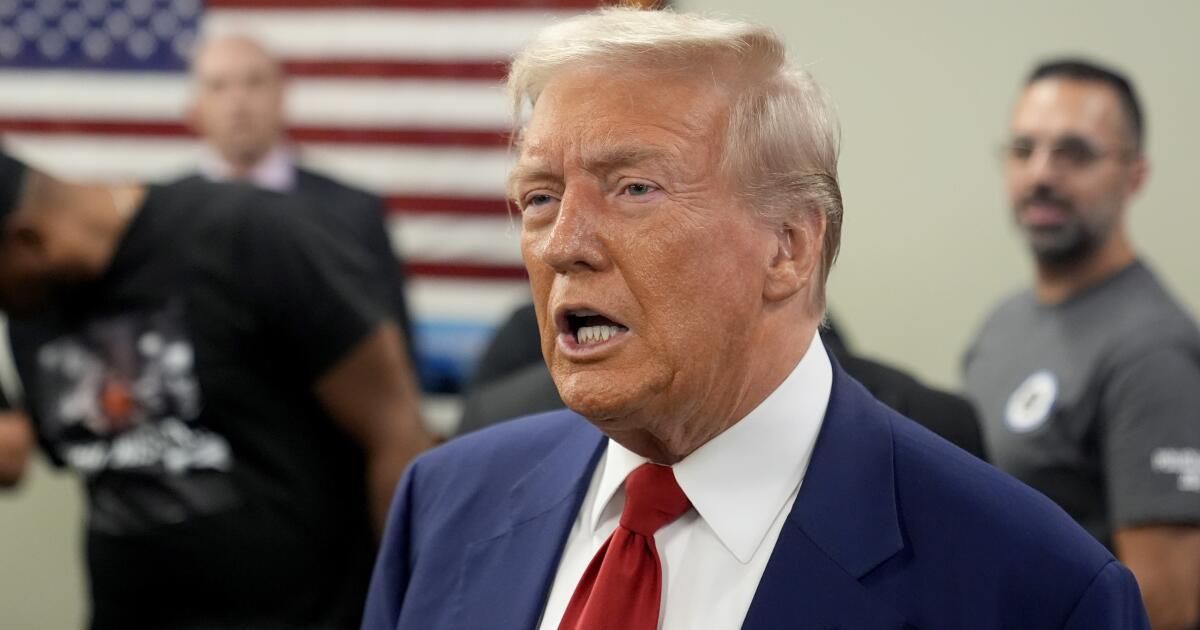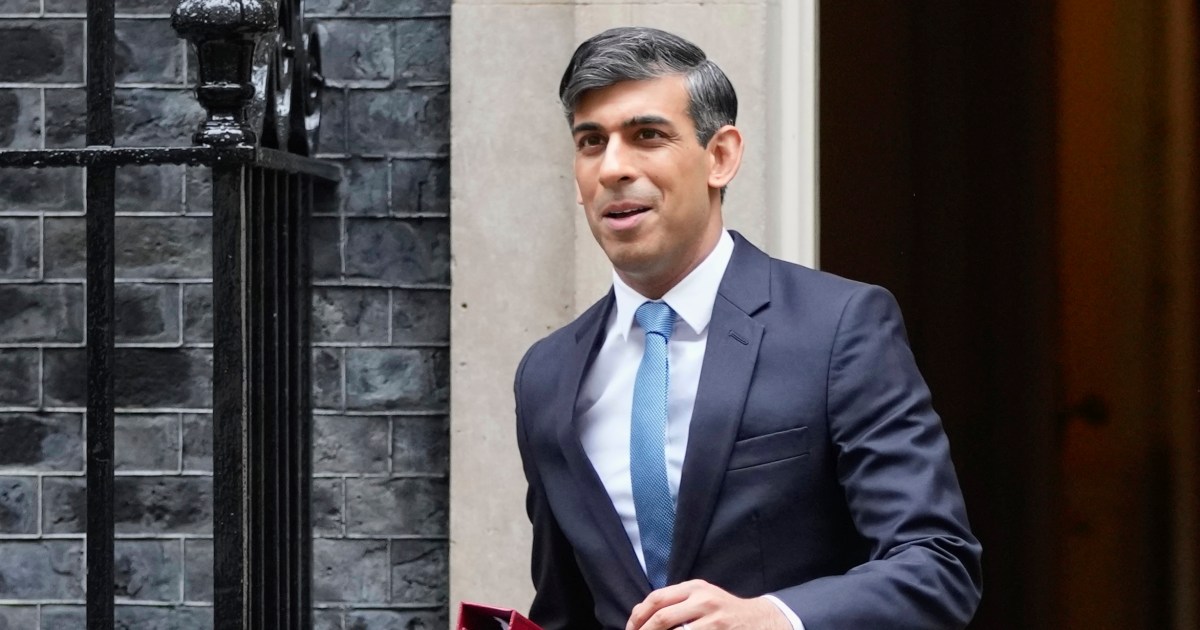If former President Trump wins the November election, he says one of his actions on “day one” — right after he begins deporting millions of undocumented immigrants — will be to enact a sweeping plan to force the federal bureaucracy to cave to his demands.
Like any president, Trump will no doubt fill the highest levels of government with loyal officials, but he also intends to impose his will by allowing lower-ranking federal employees to be fired for their political views.
“We will pass fundamental reforms that will give the president the power to fire all executive branch employees,” Trump said at the start of his campaign. “The Deep State must and will be brought under control.”
The consequences would be far-reaching.
If Trump gets his way, Justice Department prosecutors would immediately launch criminal investigations into President Biden, Vice President Kamala Harris, former President Obama and others who have drawn Trump’s ire.
The new IRS officials are likely to be ordered to audit the tax returns of prominent Democrats, an action Trump demanded during his first term.
Trump's new political ally, anti-vaccine crusader Robert F. Kennedy Jr., said last week that the candidate has asked him to oversee changes at the Food and Drug Administration, the National Institutes of Health and other public health agencies.
At the Pentagon, Trump has vowed to fire top military officials he deems “conscientious” and has promised to purge the CIA and FBI, accusing both agencies of “persecuting” conservatives and Christians, as well as investigating his 2016 presidential campaign.
These disconcerting scenarios do not spring from the imagination of Trump's critics: Trump himself has proposed them.
Behind most of them is his promise to end civil service protections, a far-reaching idea that has escaped public scrutiny because of its flimsiness.
Last year, Trump said he wants the authority to remove at will anyone he deems a “rogue bureaucrat.” “I will exercise that power very aggressively,” he added.
Cabinet officials, agency heads and other political appointees are appointed to their posts by the president and can already be fired at will.
But civil servants — officially nonpartisan officials who work under presidents of both parties — can only be fired for good cause and can appeal their firings to an independent review board.
Of the federal government's roughly 2.1 million civilian workforce, only about 4,000 are presidential appointees. Most of the rest are civil servants, including FBI agents, NIH scientists, national park rangers and IRS auditors — all of whom are affected by Trump's proposed changes.
'An army of flatterers'
Federal government experts say Trump's proposal, known as “Schedule F” after the job category it would expand, is a bad idea.
“It would turn much of the civil service into an army of sycophants,” said Robert Shea, a conservative Republican who was a senior official in the White House Office of Management and Budget under President George W. Bush.
Shea said he found the unconditional advice of public officials helpful when he was a presidential appointee. “They would tell me when what I wanted to do was stupid. They would advise me on whether it was legal or not,” he said. “But they also went out of their way to help me find better ways to do what we wanted to accomplish.”
The changes Trump has proposed, Shea said, “would mean that if you told your boss that what he or she is proposing is illegal, impractical, [or] If you are not careful, you could be branded as disloyal and fired.”
Donald F. Kettl, a retired professor of public administration at the University of Maryland, noted that if a new Trump administration were to lay off just a few employees in each agency, the rest would quickly get the message.
“Transformation can be achieved through intimidation,” he said.
At first, it might seem that allowing public officials to be fired at will would make the bureaucracy more efficient, but in practice it would open the way to politically motivated decisions and abuses of power.
An IRS to audit enemies
“The IRS is a perfect example,” Shea said. “If a political official asks someone to initiate an audit without cause, a public official might object. But if Schedule F were applied, the public official could be fired.”
Retired Marine Gen. John F. Kelly, who served as Trump’s White House chief of staff in 2017 and 2018, said after Trump left office that the then-president had demanded that the IRS investigate several of his perceived enemies, including former F.B.I. Director James B. Comey and Deputy Director Andrew G. McCabe.
The IRS, which was then run by a Trump appointee, opened audits of both men’s tax returns after Kelly left the White House. A subsequent Treasury Department investigation found no evidence that the audits were in response to Trump’s order.
Kelly told the New York Times in 2022 that Trump also wanted the IRS and Justice Department to investigate former Secretary of State (and 2016 election rival) Hillary Clinton, former CIA Director John O. Brennan, Amazon founder Jeff Bezos and others he considered enemies.
“In a second term, there would no longer be a group of principled people who could stop him,” said Donald Moynihan, a professor at the University of Michigan.
Kettl noted that Project 2025, a policy plan largely prepared by former Trump aides, proposes making the IRS deputy commissioner in charge of enforcement, who is now a civil servant, a presidential appointee. Trump has claimed he knows nothing about the report, though its lead author says he briefed the former president on its contents.
An anti-vaccine agenda at the FDA?
Even specialized agencies like the Food and Drug Administration would be vulnerable to the pressures created by Schedule F, Kettl warned.
What will happen to scientists and policymakers at the FDA and other health agencies if Trump installs Kennedy and the anti-vaccine crusader pushes his longtime agenda?
“Anyone who touches politics, or whose behavior appears to conflict with RFK [Jr.]“The FDA’s policy positions could be superseded. That would certainly apply to the FDA’s role in approving vaccines,” Kettl said. “The potential for massive change is huge. Will I be able to get a flu shot?”
Kennedy has said he would like to shift the focus of the NIH, the world's largest public funder of medical research, toward his pet cause of chronic diseases like obesity and diabetes. “We're going to give infectious diseases a break for about eight years,” he said last year.
Department of Justice
Justice Department prosecutors have long valued a high degree of independence from political pressure, but Trump has said he wants the department “completely reformed” and everyone involved in investigations into his past conduct purged.
“Since the Nixon administration, the department has been committed to pursuing justice fairly and impartially, free from political interference,” said Donald B. Ayer, who was the department’s second-highest-ranking official under President George H. W. Bush. “But that commitment is a policy, not a law.”
“If you have a bad actor who wants to break the rules, they can break the rules,” he said.
He added that stripping career lawyers of civil service protections “could have a chilling effect on their willingness to provide candid legal advice.” If those lawyers resign or are fired, he added, there may be no one left to oppose Trump’s campaign of legal retaliation. “Who’s going to stop him?” Ayer asked.
During Trump’s previous term, several of his top aides believed it was their duty to rein in the president when he proposed actions they considered illegal or reckless, such as his demand that the IRS audit his enemies, his suggestion that Army troops shoot unarmed protesters or his frequent demands to withdraw the United States from the North Atlantic Treaty Organization.
Trump later denounced those advisers as “RINOs” — Republicans in name only — and promised to appoint true loyalists in a second term. This time there will be no moderating influences.
Combine that with Trump’s plan to end civil service protections, making internal dissent a fireable offense, and you have a recipe for unbridled one-man rule.












